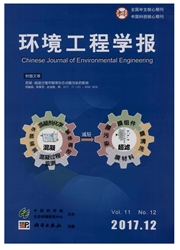

 中文摘要:
中文摘要:
针对水中含氯有机物的脱氯降解,制备了Fe/Cu双金属纳米颗粒,并引入维生素B12,研究铜负载率和维生素B12的剂量对以五氯酚为典型污染物的脱氯效果。结果表明:维生素B12和纳米零价铜能够有效提升五氯酚的脱氯速率及脱氯程度,脱氯率从4.52%增加到78.55%,降解产物从四氯酚进一步降解为苯酚。实验发现增加铜负载率可使双金属比表面积增大,催化活性位增多;增加维生素B12浓度可促进体系电子传递,使体系还原反应活性提升。铜负载率和维生素B12浓度过大均会使体系反应速率减缓甚至抑制。实验优化铜负载率为10%(质量分数),维生素B12浓度为20 mg·L^-1。探讨纳米零价铜和维生素B12的催化机理,以期对降解含氯有机物提供可操作性的参考。
 英文摘要:
英文摘要:
Dechlorination of chlorinated organic catalyzed by Fe/Cu bimetallic nanoparticles was studied in this work. The Fe/Cu bimetallic nanoparticles were prepared and vitamin B12 was introduced in the preparation process of experiment. The effect of Cu loading rate and the dose of vitamin B12 on the dechlorination efficiency of pentachlorophenol(PCP) was investigated. The results showed that the degradation efficiency of PCP could be enhanced effectively by the addition of vitamin B12 and nano-zero-valent copper. The dechlorination rate of PCP increased from 4. 52% to 78. 55% with phenol as the final degradation product instead of tetrachlorphenoxide.The specific surface area and the catalytic activity of the bimetal catalyst increased with the increasing copper loading rate. The electron transfer of the catalytic system was promoted by the addition of vitamin B12 which also increased the reduction reaction efficiency. However,the catalytic activity of the nano Fe/Cu bimetal system could be slowed down or even inhibited by high copper loading rate and concentration of vitamin B12. It was found that optimal copper loading rate and concentration of vitamin B12 were 10%(mass fraction) and 20 mg·L^-1,respectively. The catalytic mechanism of the nano-zero-valent copper and vitamin B12 were also discussed in order to provide valuable references for the similar researches on degradation of chlorinated organic compounds.
 同期刊论文项目
同期刊论文项目
 同项目期刊论文
同项目期刊论文
 期刊信息
期刊信息
